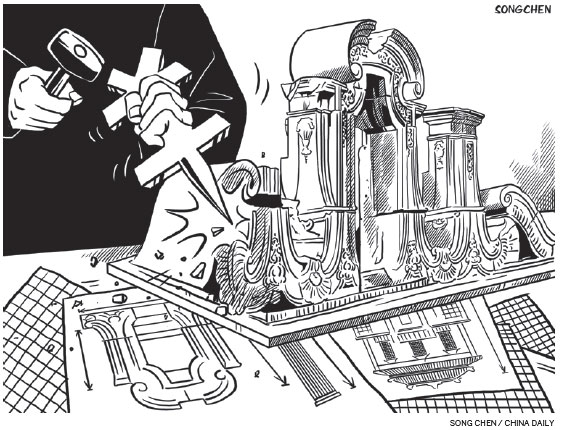Old Summer Palace replica a business stunt
The newly built replica of Yuanmingyuan, or the Old Summer Palace, ruined by British and French forces during the Second Opium War in 1860, was partly opened to the public on Sunday in Hengdian, East China's Zhejiang province, some 1,400 kilometers south of Beijing, the original site of the palace.
The operator of the replica said the complex, spread over 6,200 mu (413 hectares), is expected to be completed by the end of next year. Ninety-five percent of the replica, to be built to the scale of the original Yuangmingyuan for 30 billion yuan ($4.84billion), will follow the original architecture.
The ruins of Yuanmingyuan, built in 1707 during the Qing Dynasty (1644-1911) and well known for its architectural diversity, are widely seen as a sign of the fall of the Chinese nation under the impact of Western invasions. They also remind Chinese people not to forget the humiliating experience and warn them that backwardness could lead toward such sufferings and humiliation again.
Considering history, the ruins of Yuanmingyuan should be preserved and there is no need to build a better-looking replica. The historical value of a cultural heritage like Yuanmingyuan is not only immeasurable, but also irreplaceable. A replica, irrespective of its architecture and similarity to the original, cannot replace the historical essence and connotation of the original.
In fact, the building of the replica in Hengdian, a Hollywood-like film studio in China, has been shrouded in controversy ever since the project was announced in 2008. But some people have welcomed the replica, saying it will not only offer Chinese people a chance to appreciate the marvelous craftsmanship of the original Chinese royal garden and its exquisite architecture, but will also help them to better understand traditional Chinese culture.
Xu Wenrong, founder of the Hengdian Group that initiated the replica project, says the relics of the Old Summer Palace in Beijing remind us of the history of foreign invasions in China, while the replica in Hengdian will showcase China's traditional wisdom and creativity.
Critics, however, differ. Some have accused the money-guzzling replica project of bastardizing a site associated with Chinese patriotism, because the Old Summer Palace ruins are often used as an apt example for patriotic education for youngsters.
"Yuanmingyuan should not be regarded only as a royal architectural garden, rather it should be viewed more as a symbol of Chinese disgrace and humiliation which should not be recreated in another place," says a netizen critical of the Hengdian replica. The Hengdian project has also drawn skepticism from the management of Yuanmingyuan. In response to the planned May opening of the replica, managers of the original palace earlier said that they could take legal action if the replica violated intellectual property laws.
Given that the Hengdian project has reportedly obtained approval for land use from local authorities and went through the relevant procedures, the building of the replica seems legitimate despite the controversy. Its construction without government funds and its planned commercial operation also mean that it is up to the market to decide its fate and popularity.
The Hengdian Group said it expects 40 million to 50 million people to visit the replica and generate 4 billion yuan to 5 billion yuan in ticket sales every year after five years of its opening. It expects the number of visitors to increase to 80-100 million after 10 years.
Maybe the Hengdian Group will reap another commercial harvest from the project in the name of "cultural relics" after making huge economic gains from the replicas of the Palace Museum (Forbidden City) and the Tian'anmen Gate Tower. But a commercial success is only a commercial success; it can never carry any historical connotations.
Like other commercial endeavors, the building of the Yuangmingyuan replica in Hengdian is only a commercial stunt which has nothing to do with the original Yuanmingyuan in Beijing.
The author is a senior writer with China Daily.



















